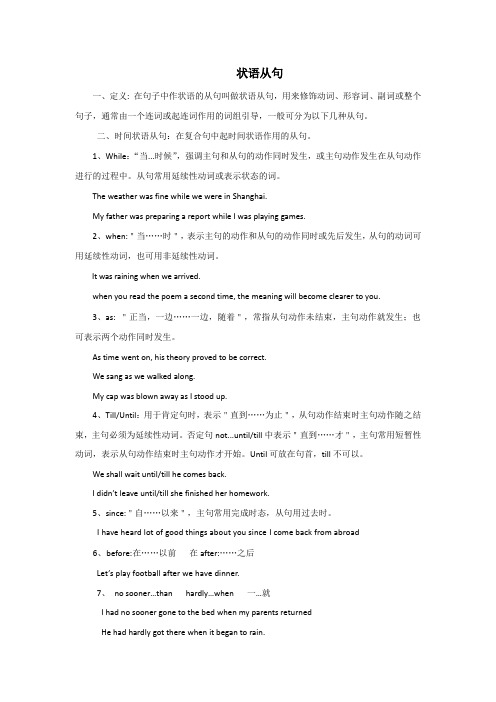高考英语复习 状语从句讲解
高考时间状语从句知识点

高考时间状语从句知识点高考对于每位学生来说都是一次至关重要的考试,备战高考需要有一定的时间管理技巧和考点掌握。
在英语考试中,时间状语从句是一个重要的知识点。
本文将为大家详细介绍高考英语中关于时间状语从句的知识点。
一、什么是时间状语从句时间状语从句是由连词引导的从句,用来表示一个动作或事件发生的时间。
常见的时间状语从句引导词有when, while, as, before, after, since, until等。
二、时间状语从句的分类1. 简单句:当从句中的动作发生在主句动作发生之前或同时时,我们使用一般过去时。
例子:When he arrived, we had already finished our dinner.2. 过去将来时:当从句中的动作发生在主句动作发生之后,我们使用过去将来时。
例子:I knew he would pass the exam before he told me.3. 一般现在时:当从句中的动作经常发生或主句谓语动词为一般现在时时,我们使用一般现在时。
例子:We usually go for a walk after we have dinner.4. 一般将来时:当从句中的动作在主句动作之后发生时,我们使用一般将来时。
例子:You will know the answer once you finish the test.5. 完成时:当从句中的动作在主句动作之前发生,我们使用完成时。
例子:I will call you as soon as I have finished my work.三、时间状语从句的位置时间状语从句可以放在主句之前或之后,但需要注意的是,如果从句放在主句之前,两个句子之间需要用逗号隔开。
例子:Before we start the meeting, please turn off your cellphones.或者:Please turn off your cellphones before we start the meeting.四、典型错误在高考英语中,学生常常犯以下几个典型错误:1. 主句和从句的时态不一致。
状语从句+课件-2024届高考英语一轮复习

状语从句省略
前提:
1. 从句的主语 与 主句的主语一致; 2. 从句中需有be动词。
省略时需把从句主语和be动词一起省 略。
He fell asleep when he was doing his homework. When I was surfing the net, the power was off. His father died when he was only three.
二. 连接词
语气最弱,看到一个现象去反推可能的情况 It must be morning,for the birds are singing.
原因状语从句
常见:because, as, since, for
用法几乎一致,表示直接的原因,as语气稍 弱。 As he is too yong, he can’t join the army.
二. 连接词:时间状语从句 一... 就....
no sooner... than... I had no sooner seen you than I smiled. hardly... when...
二. 连接词:时间状语从句 一... 就....
no sooner... than... I had no sooner seen you than I smiled.
二. 连接词
让步状语从句
1. although,though, as 虽然,尽管 2. even if , even though 即便,即使 3. 特殊疑问词+ever/ no matter + 特殊疑问词 不论
二. 连接词:让步状语从句 3. 特殊疑问词+ever/ no matter + 特殊疑问词 不论
高考状语从句知识点

高考状语从句知识点状语从句是高考英语中的一个重要知识点,掌握好它对于我们在高考中取得好成绩可是相当关键哦!今天咱们就来好好聊聊状语从句。
先来说说啥是状语从句。
简单来讲,状语从句就是用一个句子来充当状语。
那啥是状语呢?就好比咱们跑步的时候,给你加油打气的那些话,告诉你跑快一点、跑慢一点、往这边跑、往那边跑,这些起辅助说明作用的就是状语。
而用一个句子来做这个辅助说明的工作,那就是状语从句啦。
状语从句的种类那可不少,有时间状语从句、地点状语从句、原因状语从句、条件状语从句、目的状语从句、结果状语从句、让步状语从句、比较状语从句和方式状语从句等等。
咱们先来说说时间状语从句。
比如说“When I was a child, I often played in the park” 这里的“When I was a child”就是一个时间状语从句,表示“当我还是个孩子的时候”。
再比如“While I was doing my homework, my mom was cooking dinner” 这里的“While I was doing my homework”表示“当我正在做作业的时候”。
记得我以前教过一个学生,叫小李。
有一次考试,他就因为时间状语从句丢了不少分。
那次考试有一道题是这样的:“______ he came in, I was reading a book” 选项有“When、While、As”。
这小李啊,想都没想就选了“While”,结果就错啦。
后来我给他分析,这题应该选“When”,因为“While”强调的是动作的同时进行,而这里“came in”是一个短暂性动作,“reading a book”是一个持续性动作,所以要用“When”。
从那以后,小李可长记性了,每次遇到时间状语从句的题都会仔细分析。
接下来是地点状语从句。
像“Where there is a will, there is a way” 意思就是“有志者,事竟成”,这里的“Where there is a will”就是地点状语从句,表示“有意志的地方”。
高考英语语法状语从句讲义

状语从句一、定义: 在句子中作状语的从句叫做状语从句,用来修饰动词、形容词、副词或整个句子,通常由一个连词或起连词作用的词组引导,一般可分为以下几种从句。
二、时间状语从句:在复合句中起时间状语作用的从句。
1、While:“当...时候”,强调主句和从句的动作同时发生,或主句动作发生在从句动作进行的过程中。
从句常用延续性动词或表示状态的词。
The weather was fine while we were in Shanghai.My father was preparing a report while I was playing games.2、when:"当……时",表示主句的动作和从句的动作同时或先后发生,从句的动词可用延续性动词,也可用非延续性动词。
It was raining when we arrived.when you read the poem a second time, the meaning will become clearer to you.3、as: "正当,一边……一边,随着",常指从句动作未结束,主句动作就发生;也可表示两个动作同时发生。
As time went on, his theory proved to be correct.We sang as we walked along.My cap was blown away as I stood up.4、Till/Until:用于肯定句时,表示"直到……为止",从句动作结束时主句动作随之结束,主句必须为延续性动词。
否定句not...until/till中表示"直到……才",主句常用短暂性动词,表示从句动作结束时主句动作才开始。
Until可放在句首,till不可以。
We shall wait until/till he comes back.I didn’t leave until/till she finished her homework.5、since:"自……以来",主句常用完成时态,从句用过去时。
2024届高考英语二轮复习:状语从句课件-(共19张PPT)

2024届高考英语二轮复习:状语从句课件-(共19张PPT)(共19张PPT)状语从句状语是句子中的一个重要附属成分,从情况、时间、处所、方式、条件、对象、肯定、否定、范围和程度等方面对谓语中心词进行修饰、限制。
状语从句(副词性从句)是在句子中做状语的,起副词作用的从句。
状语从句可以修饰谓语、非谓语动词、定语、状语或整个句子。
概念分类状语从句时间状语从句条件状语从句让步状语从句结果状语从句原因状语从句地点状语从句目的状语从句方式状语从句比较状语从句时间状语从句1. when, while, as引导的时间状语从句when引导的从句动作与主句动作可以同时发生也可以先后发生,动词可用延续性也可用非延续性I was reading a book when he entered the room.I knocked a boy when he passed by.He always bothers me when I am working.时间状语从句while引导的从句动作与主句动作同时发生,动词用延续性I was reading a book while he was doing his homework.as强调主从句动作相伴发生,“一边...一边...; 随着...”As time goes on, he will understand.We watch TV as we eat.2. before, since引导的时间状语从句before:在...之前,才,不久常考句型:a. It will (not) be + 时间段+ before... “要过多久...才/过不了多久...就”It will be a long time before the professor finishes his dictionary.It won’t be a long time before he comes back.时间状语从句b. It was not long before... “不久就...”It was not long before he told me the truth.c. It was + 时间段+ before... “过了...才...”It was two years before we met again.时间状语从句时间状语从句since:自从..., ...以来It is / has + 一段时间+ since...(一般过去时)“自从...已经过了...”It has been five years since I came to the town.It is a month since I began to study German.3. 表示“一...就...”的单词短语引导的时间状语从句a. as soon as: 主将从现/ 主从都用一般过去时As soon as he comes, we will set out for Shanghai.b. the moment, the minute, the instantI wanted to call at him the minute/second/instant he arrived.c. immediately, directlyWe'll come directly we have finished the work.d. hardly/scarely ... when..., no sooner ... than...(主句过完,从句一过)She had hardly had time to sit when the phone rang again.时间状语从句时间状语从句4.until / till引导的时间状语从句a. until / till用于肯定句时,主句谓语动词用延续性I will wait for you until / till you come to see me.b. until / till用于否定句时,主句谓语动词可用延续性或非延续性I didn’t go to bed unit I finished my homework.c. not unit 位于句首,主句部分倒装Not until Tom came in did we stop talking.条件状语从句常考引导词:if, unless, so long as, in case, only if, on condition that... Suppose he can't come, who will do the workThe meeting would be put off in case it should rain.时态:主将从现I will go to hospital if I am free tomorrow.She was allowed to go back on condition that she would sleep.让步状语从句常考引导词although, though: 尽管,可与yet, still, nevertheless连用,不能和but 连用Though he seems happy, yet he is worried.He says he'll pay, though I don't think he will.as:从句倒装Successful as he is, he is not proud.while:尽管While he is ugly,he is smart.让步状语从句常考引导词even if/ thoughEven if I am young, I can manage it.no matter +疑问词/ 疑问词+everNo matter what / Whatever he faces, he will never give up. whether... or notWhether you believe it or not,it's true.结果状语从句a. so + 形容词/副词+ that ...He runs so fast that I can’t catch up with.It is so interesting a movie that I can’t wait to watch.b. such + 名词+ that ...It is such an interesting movie that I can’t wait to watch. They are such good students that the teachers all like them.原因状语从句because:回答why的问题,语气最强He can’t come because he is ill.since/now that:既成事实的原因Since (now that) you're here, you can help me.as:双方都知道的原因,主句说明结果As it was raining, the match was cancelled.地点状语从句常用where / wherever引导,位于主句前,中或后Stay where you are and don’t move.Where there is a will,there is a way.Wherever there is smoke,there is fire.目的状语从句so that,in order that “为了,以便”(从句用情态动词)He runs fast so that he can get on the first bus.In order that he can finish the work, he didn’t sleep for a whole night.for fear that, in case, “以防”(从句中的谓语动词用should / might / could+动词原形)I will not make a noise for fear that I should disturb you.He takes a torch in case it gets dark before he returns.方式状语从句as “按照”You should wait in line as others do.He did as I had asked.as if / as though (从句可以虚拟)The boy talks as if he were an old man.She paused as if she was waiting for him to speak.比较状语从句than “比...”,用形容词或副词的比较级You look much better than you did weeks ago.There is no prettier girl than Helen is.as...as, not as/so...as ,相同程度的比较,用形容词或副词的原级He knows as much as I do.She doesn't work so hard as you do.。
2024届高考英语一轮复习语法:状语从句课件

The dog will eat a cake as soon as the cat leaves.
主句
从句
2.地点状语从句
地点状语从句
引导词:where + 强调形式
Wherever,everywhere,anywhere 不管哪里,任何地方,所有地方
2.地点状语从句 狗狗在发现蛋糕的地方吃了它。 The dog ate the cake where he found it.
1.时间状语从句 在某一时间之中 引导词:when while as
when: 时间点,“突然”
我到家的时候,狗狗在吃蛋糕。
The dog was eating a cake when I reached home.
e:时间段
我在做饭的过程中,狗狗在吃蛋糕。
The dog was eating a cake while I was cooking.
She is as beautiful as Snow White. 她和白雪公主一样漂亮.
3.比较状语从句
比较状语从句:更…
He is smarter than I. He is smarter than l am.
This cake is bigger than that one. This cake is bigger than that one is.
Because > since > as
因果/语气
原 因
because > since > as
状 语 because 引导的实实在在的因果关系
从 句
since 引导的是众所周知的事实
as 引导的是显而易见的事实
高考英语-状语从句专题课件

目的状语从句
目的状语从句在主句中表示目的。 其连接词有so(以便),so that(为 了),in order that(为了)等,从句 中多用情态动词can,will,may, should。
目的状语从句
He got up very early so that he could catch the first train. 他起床很早以便于赶第一班火车。 I will run slowly so that you can catch up with me. 我慢慢跑以便你能赶上我。
结果状语从句
结果状语从句在主句中表示结果。 其连接词有so······that······(如此······以 至于······),such······that······(如 此······以至于······)等。
结果状语从句
It’s such a good chance that you can’t miss it. 这次机会如此好,你不能失去它。 注意: so···that 和such···that 都可以引导 结果状语从句,so和such后面所 接的词不同。
原因状语从句
原因状语从句在主句中表示原因或者 理由。 其连接词有because(因为), as(因为), since(既然)等。
原因状语从句
1、原因状语从句例句
eg:I often eat carrots because they are good for my health. As I don’t know the way, I had to ask the 语从句
If winter comes,can spring be far behind? 冬天来了,春天还会远吗?
让步状语从句
高考状语从句知识点

高考状语从句知识点状语从句是高考英语中的一个重要语法点,理解和掌握状语从句对于提高英语成绩至关重要。
状语从句在句子中充当状语,用于修饰动词、形容词、副词或整个句子。
一、状语从句的分类状语从句可以根据其表达的意义分为以下几类:1、时间状语从句常用的引导词有:when(当时候),while(在期间),as(当时;一边一边),before(在之前),after(在之后),since(自从),until / till(直到)等。
例如:When I was a child, I often played in the park (当我还是个孩子的时候,我经常在公园玩耍。
)While I was reading, my mother was cooking (我在读书的时候,我妈妈在做饭。
)2、地点状语从句常用的引导词有:where(在地方),wherever(无论哪里)例如:Where there is a will, there is a way (有志者,事竟成。
)Wherever you go, I will follow you (无论你去哪里,我都会跟着你。
)3、原因状语从句常用的引导词有:because(因为),since(既然),as(由于)例如:Because it was raining hard, we stayed at home (因为雨下得很大,我们呆在家里。
)Since you are here, you might as well stay for dinner (既然你在这里,不妨留下来吃晚饭。
)4、目的状语从句常用的引导词有:so that(以便;为了),in order that(为了)例如:He studies hard so that he can pass the exam (他努力学习以便能通过考试。
)I got up early in order that I could catch the first bus (我起得很早为了能赶上第一班公交车。
- 1、下载文档前请自行甄别文档内容的完整性,平台不提供额外的编辑、内容补充、找答案等附加服务。
- 2、"仅部分预览"的文档,不可在线预览部分如存在完整性等问题,可反馈申请退款(可完整预览的文档不适用该条件!)。
- 3、如文档侵犯您的权益,请联系客服反馈,我们会尽快为您处理(人工客服工作时间:9:00-18:30)。
状语从句状语从句一什么是状语从句二状语从句位置三状语从句分类四特殊句式五状语从句常见考点六练一练一什么是状语从句状语从句是行使状语功能的从句,因为其作用相当于副词,它可以用来修饰谓语、定语、状语或整个句子。
状语从句通常由一个连接词或起连接词作用的词组引导。
二状语从句位置比较灵活,有时可以放于句首,有时可以置于句末。
状语从句位于句首时,其后常用逗号与后面的句子隔开。
三状语从句分类让步状语though, although, even though, while whether ,whoever/no matter who ,whatever/ n o m atter w hat ,whenever/ no matterEven t hough y ou s ay s o, I d o n ot believe it.比较状语 than as …as ,the more … the moreThe m ore I s ee him , t he l ess I l ike h im. 方式状语as, as if , as thoughHe t old m e e verything a s i f I w ere h isbest friend.四 特殊句式时间状语中 A:It + b e +时间点+ w hen …… 当某事发生时是什么时候It was 11:00 PM when he came back last night.B:It i s/has b een +时间段 + s ince …… 自从某事发生后已过了多久时间It i s /has b een t wo y ears s ince I e ntered t he t he s enior s chool.C:It + be +时间段 + before …… 在某事发生之前需要多久时间It was 8 years before we finally drove away the Japanese invaders. It m ight b e a l ong t ime b efore C hinese l and o n t he m oon.让步状语从句A: as 引导的让步状语从句, 从句的表语、状语必须前置到句首。
Short as he is, he plays basketball very well.Child as he is, he is knowledgeable. (开头 0 冠词的用法)1 2Much a s I r espect him, I c an n ot a gree w ith h im.B:though 引导的让步状语从句,可以倒装,也可以倒装。
C:其他词引导的都不能倒装。
状语从句的省略现象当主从主语一致,且从句谓语中含有 b e 动词,此时,可以省略从句的主语和 b e 动词A: She always sings while (she is)doing her homework. B: O nce (it i s) s een, i t c an n ever b e f orgotten. C: T hough (it w as) c old, h e s till w ore a s hirt.条件状语从句A:真实条件状语:条件是事实或者在讲话人看来所提出的假设完全可以成为现实 ---> 谓语用陈述语气Ⅰ 从句中的条件是前提,主句中的情境能否实现,取决于条件能否实现。
在这 种条件状语从句,动词不能用将来时态,而用一般现在时代替将来时,用现在完 成时代替将来完成时If you trust before you try, you may repent (后悔) before you die. If we catch the 10 o’clock train, we may get there by lunch time.Ⅱ 主句用祈使句,表示讲话人的请求或提议 If y ou w ish f or p eace, b e p repared f or w ar.Ⅲ 当从句表示到将来某个时刻已经完成或正在进行的动作时,动词可用现在完 成时或现在进行时。
I will return the book on Monday if I have finished it. The p olice won ’t take y our car away if you are s itting in it.3 4Ⅳ表示习惯性动作、科学真理或客观事实,主从句中的动词时态或所使用的情态动词通常一致。
If you pour oil on water, it floats.如果我们把红色和黄色混合起来,我们就得到了橘色。
B:非真实条件状语:指的是所提出的假设实现的可能性极小或与事实相反,谓语动词用虚拟语气。
Ⅰ与现在事实相反:从句谓语动词:v-ed/ were主句谓语动词:would/ could/ might/ should + v.例句:If she worked more slowly, she would not make so many mistakes.I shouldn't go there if I were you.Ⅱ与过去事实相反:从句谓语动词:had done主句谓语动词:would/ c ould/ might/ should + have d one例句:If I had realized t hat he was ill, I should have o ffered to help h im.If anything had happened, he would have let her know.Ⅲ与将来事实相反:从句谓语动词:were + to doshould + dov-ed/ w ere (从句中有表示将来的时间的状语)主句谓语动词:would/ c ould/ might/ should + have d one例句:If the rain were to go on, the crops would be in danger.If I saw/should see/were to see him t omorrow, I would invite h im h ome.Ⅳ当非真实条件状语从句中有s hould, had 或w ere 时,可以省略i f,而把s hould, had 或w ere 提至主语前。
Had I worked hard, I would have surly succeeded.Were s he m y d aughter, I w ouldn’t a llow h er t o s tudy a broad.Ⅴ错综时间条件句:有时非真实条件句谓语动词表示的动作与主句谓语动词表示的动作发生的时间不一致,这叫错综虚拟语气或混合虚拟语气,此时主句与从句的谓语动词的形式根据各自发生的时间来确定。
If I w ere y ou, I w ouldn’t h ave m issed t he c oncert l ast n ight.If you had told m e the news yesterday, I wouldn’t be so worried now.If you h esitated t his m oment, you might s uffer i n future.让步状语从句5A: while 尽管,虽然While w e d on’t a gree, w e c ontinue t o b e f riends.While I understand what you say, I can’t agree with you.B: b e 不管,不论相当于whether or notBe he friend or enemy, the law regards him as a criminal.C: if 即使,虽然If life there was f ull of hardship, it was full of joy and excitement.五 状语从句 考点时态问题过去完成 一般过去 过去将来 现在完成 一般将来 将来完成在条件,时间和让步从句中, 一般现在时表示一般将来时,用现在完成时表将来完成时,用一般过去时表 过去将时。
在 since 引导的时间状语从句中,动词一般都用一般 过去时,而主句常用现在完成时。
倒装问题(***) A:否定词开头; B:so 加 adj. 开头;C: as / though 引导的让步状语从句。
特别注意句式(看见必考倒装)Hardly … when … ,No sooner … than …, n/adj , as he is 例句:Hardly had he got to the station when the train left. No sooner had he got to the station than the train left. Child a s h e i s, h e c an s peak s even f oreign l anguages.省略问题当状语从句的 主语和主句的主语一致时,可以省略状语 从句中的主语和系动词 be.1 2 3A: 连词+过去分词Don’t speak until spoken to.B:连词+现在分词Look out while crossing the street.C: 连词+ 形容词/ 其他常见的有if necessary, if possible, when necessary, if any 等④ 条件状语从句中 unless 和 if not 不可替换的情况如下A: 当i f…not 从句是一个非真实条件句时,unless 不能替换If she weren’t so silly, she would understand.B: unless 强调例外条件I will l eave a t 9, unless y ou want to g o e arlier.C: unless 从句为否定时Don’t ask me to explain unless you really don’t understand.⑤ 引导让步状语从句时,疑问词-ever 与“no matter +疑问词”完全相同,可以互换。
但是疑问词-ever 可以引导名词性从句,“no matter + 疑问词”则不可。
